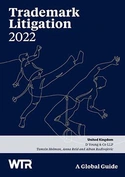T‑592/20: bad faith – timing is everything
In March 2017, Univers Agro Ltd filed a European Union trade mark (EUTM) application for the word AGATE in class 12, which proceeded to registration in June 2017. In July 2017 the registration was used to bring infringement proceedings against Shandong Hengfeng Rubber & Plastic Co. Ltd, (Shandong) and its distributor’s use of the figurative mark (shown below) for goods in class 12 in Bulgaria. Shandong subsequently applied to invalidate Univers Agro’s mark on bad faith (amongst other grounds).

Both the EUIPO Cancellation Division and Board of Appeal invalidated the registration, holding the evidence showed Univers Agro had filed the application with the intention of taking advantage of Shandong’s market share given that Shandong’s mark was not registered in Bulgaria; the chronology of events showed Univers must have known that Shandong was using its mark through its distributor in Bulgaria; and Univers Agro had no honest intention to use its own mark.
Univers Agro appealed, denying it had knowledge of the AGATE mark, Shandong or its distributor before March 2017. It further claimed that the volume of use of the Shandong mark was extremely low and that it was too high a burden for it to know of all conflicting use by competitors. Therefore, it denied that there should be a presumption it was aware of the Shandong use at the time it filed its EUTM application. In support, Univers Agro stated it had undertaken a clearance search prior to filing the EUTM application and no risks had been identified. Finally, it claimed Shandong had falsified documents to support its own position.
General Court decision
Bad faith exists where there is evidence of dishonest practices, for example, where there is no intention to trade fairly and honestly, but an intention to undermine another’s interest. Knowledge of another’s use of a sign may arise from knowledge of the sector involved and if the sign in question has been used for a long period of time, from an inference that in light of the duration of use, the other party must have known about the prior sign. Whilst there is a presumption of good faith prima facie, once this has been called into question, the proprietor of the mark being invalidated needs to prove its actions were in good faith.
There was no evidence that Shandong had tampered with any evidence and so, the Board of Appeal was right not to question its authenticity. It was acknowledged that the search report relied on by Univers Agro contained no information concerning the Chinese trade mark Agate but it was lacking in information relating to the geographical scope and extent of the search and does not categorically rule out that there could be problematic marks or other risks. Therefore, the report could not conclusively be relied on.
It was noted by the Board of Appeal that there was a very short period of time between Univers Agro’s mark being registered in June 2017 and Univers bringing infringement proceedings Shandong in July 2017. The short time frame supports an argument that Univers Agro must have known about the Shandong mark earlier than claimed.
Further, whilst acknowledging that a trade mark owner does not have to have used its mark in order avoid a bad faith finding, the question remains that you do need to consider whether the trade mark owner had any intention to use the mark at all at the time of filing. In the present case, indications were that Univers Agro did not have any such intention because there was a complete lack of evidence showing any commercial plans to use the mark.
The Board of Appeal was therefore entitled to hold that in view of the short period of time between filing and registering its mark and then bringing proceedings against Shandong, Univers Agro must have already known about Shandong’ use, and seized an opportunity to take advantage of the fact Shandong had not protected its mark.
In addition, evidence submitted by Shandong and accepted by the court, showed that Univers agro had “hindered others” by contacting representatives of Shandong and canvassing their views. The Board of Appeal found this amounted to dishonest practices.
In light of the above, Univers was deemed to have acted in bad faith and its appeal was dismissed.
Comment
Bad faith claims are notoriously difficult to sustain; however, what this case demonstrates is that in circumstances where the evidence, in its totality, indicates a presumption of knowledge, and shows behaviour that can be described as dishonest, the courts will be likely to find bad faith.
Each case will be assessed on its own merits but here, given that a legal action was brought within one month of the mark being registered, and only four months after the mark was filed, coupled with the activities of Univers Agro in its dealings with the other side, the courts felt the facts clearly lent themselves to a finding of bad faith.


